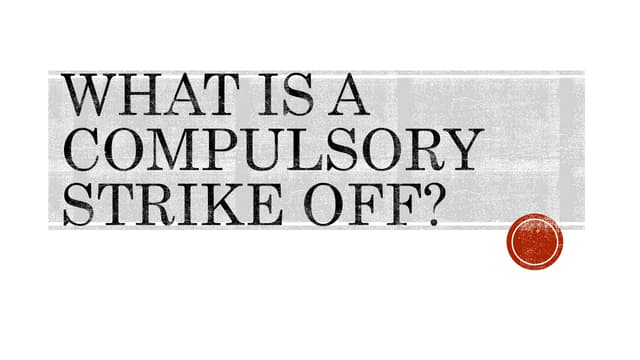First Gazette Notice for Compulsory Strike Off Described
First Gazette Notice for Compulsory Strike Off Described
Blog Article
Comprehending the Refine and Effects of Compulsory Strike Off Under Company Legislation
In the world of firm law, the process and effects of compulsory strike off hold considerable weight for services and their supervisors. Understanding the intricacies of why business deal with such an end result, the precise actions associated with the strike off procedure, and the far-ranging implications for all parties included is vital in browsing the complex landscape of corporate administration. As we explore the factors behind compulsory strike offs, the occurring procedures, and the subsequent repercussions, a clearer photo arises of the extensive influence it can carry entities and people alike.
Factors for Compulsory Strike Off
Obligatory strike off under firm regulation is launched by the governing authorities for certain factors connected to functional or non-compliance abnormalities. The key factor for a business to deal with obligatory strike off is the failure to file yearly returns or economic declarations for an extensive duration. This non-compliance suggests a lack of transparency and adherence to regulatory needs, raising issues about the firm's monetary health and wellness and responsibility.

Refine of Strike Off
Given the regulatory authority's initiation of compulsory strike off for various factors, comprehending the procedure of strike off is crucial for companies encountering possible dissolution under business legislation. The process typically starts with the governing authority sending out notices to the business's authorized office address, informing them of the upcoming strike off. It is crucial for the firm to attend to any outstanding concerns, such as submitting overdue papers or working out impressive fees, within the defined timeframe to stay clear of dissolution.

Effects for Business
What are the ramifications for companies dealing with required strike off under firm law? Business dealing with compulsory strike off may come across a number of considerable effects.
Furthermore, the business's properties at the time of strike off become residential or commercial property of the state, which can cause economic losses for creditors and investors. Investors might shed their financial investments, while financial institutions might struggle to recoup any kind of arrearages owed to them by the struck-off firm.
In addition, supervisors of the business may encounter incompetency from holding similar positions in various other firms for a given period (first gazette notice for compulsory strike off). This can stain their expert reputation and restrict their future service chances
Consequences for Supervisors
Dealing with compulsory strike off under firm legislation can have severe implications for directors, impacting their future functions in other firms and potentially staining their expert standing. Directors of a business facing obligatory strike off may find it testing to secure directorial placements in other firms in the future. This is because the my explanation strike off shows a failure to adhere to legal commitments, increasing concerns regarding the supervisor's capability to fulfill their duties successfully. Furthermore, the stained professional track record arising from an obligatory strike off can lead to a loss of depend on from company companions, customers, and stakeholders. Directors may likewise encounter individual financial obligations if they are discovered to have actually acted negligently or fraudulently, leading to potential legal actions versus them. Overall, the consequences of mandatory strike off for supervisors prolong past the details company concerned, impacting their profession potential customers and expert read this reliability in the long term.
Avoiding Compulsory Strike Off

Conclusion
Finally, comprehending the process and ramifications of obligatory strike off under business regulation is important for business and supervisors to make certain conformity with regulations. By understanding the reasons for strike off, the process included, and the repercussions for all celebrations included, firms can take actions to stay clear of undergoing required strike off. It is necessary for supervisors to be aggressive in preserving appropriate documents and conference legal commitments to stop the risk of strike special info off.
Offered the regulatory authority's initiation of mandatory strike off for various factors, recognizing the process of strike off is vital for companies facing possible dissolution under business legislation.What are the ramifications for firms dealing with mandatory strike off under firm regulation?Dealing with compulsory strike off under firm legislation can have severe implications for directors, impacting their future roles in various other firms and potentially staining their expert standing. Directors of a firm dealing with compulsory strike off might find it testing to protect directorial positions in various other business in the future.In conclusion, comprehending the process and implications of obligatory strike off under company regulation is vital for supervisors and business to ensure conformity with regulations.
Report this page